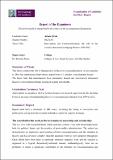| dc.description.abstract | Consociational systems in post-conflict societies have been increasingly subject to international intervention. Whereas the literature argues that consociationalism has become the blueprint for international post-conflict institutional design, there remains the need of in-depth exploration of the external dimension of consociationalism. This thesis explores the relationship between international intervention and the viability of consociationalism in Kosovo as a crucial case of international intervention. In doing so, one question is asked: How has international intervention shaped Kosovo's complex consociational design? The four constituting elements of consociationalism are examined: the electoral system, executive power-sharing, veto powers and autonomy. Forty-one elite interviews including international civil servants and Kosovo leaders from all ethnic communities were conducted.
The thesis finds that each consociational element examined displays high levels of instability, a persistence of international micro-management and de facto partition pairing with consociational design. Secondly, rather than an international blueprint of international intervention, Kosovo¿s consociational design was shaped in response to short-term concerns about internal and external stability. Thirdly, rather than a bottom-up reaction of Kosovo Serbs to Kosovo's institutional evolution, a novel finding here is that international interveners played with both consociation and de facto partition strategies due to the failure to timely address Kosovo's final status. Thus, international interveners undermined what they imposed by establishing excessive control over Kosovo's institutional evolution and by allowing, condoning, and at times, facilitating, Belgrade-steered partitionist intervention which exists in tandem with a weak and unviable consociational design resulting in an unviable state. | en_US |



